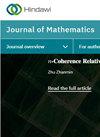A Novel Opportunity Losses-Based Polar Coordinate Distance (OPLO-POCOD) Approach to Multiple Criteria Decision-Making
IF 1.3
4区 数学
Q1 MATHEMATICS
引用次数: 0
Abstract
The ability to make decisions is crucial for achieving success in any field, particularly in areas that involve managing extensive information and knowledge. The process of decision-making in real-world scenarios often involves considering numerous factors and aspects. It can be challenging to make decisions in such complex environments. In this paper, we present a new technique that solves multicriteria decision-making (MCDM) problems by considering opportunity losses-based polar coordinate distance (OPLO-POCOD). MCDM is a subdiscipline of operations research in which some alternatives are evaluated concerning some criteria to choose the most optimal alternative(s). Opportunity loss is a fundamental concept in economics and management, which can be used as a basis for determining the value associated with information. The authors emphasize that the technique incorporates the concept of opportunity losses and uses distance vectors in polar coordinates, making it a compelling approach. By considering opportunity losses, decision-makers gain a better understanding of the trade-offs involved in selecting alternatives, enabling them to make more informed decisions. Finally, the proposed method is exhibited through the use of numerical an example to illustrate its process. Additionally, a comparative sensitivity analysis is conducted to evaluate the outcomes of OPLO-POCOD and compare them with existing MCDM methods. The OPLO-POCOD method is found to have high reliability compared to other methods, as indicated by Spearman’s correlation coefficient, which is greater than 0.9. The method shows a correlation of over 98.5% with TOPSIS, COPRAS, ARAS, and MCRAT methods, demonstrating its robustness and effectiveness. These analyses show the efficiency of the proposed method and highlight the stability of the results.基于机会损失极坐标距离(OPLO-POCOD)的多标准决策新方法
决策能力对于在任何领域取得成功都至关重要,尤其是在涉及管理大量信息和知识的领域。现实世界中的决策过程往往需要考虑众多因素和方面。在如此复杂的环境中做出决策是极具挑战性的。在本文中,我们提出了一种通过考虑基于机会损失的极坐标距离(OPLO-POCOD)来解决多标准决策(MCDM)问题的新技术。多标准决策(MCDM)是运筹学的一门分支学科,在这门学科中,要根据一些标准对一些备选方案进行评估,以选出最优的备选方案。机会损失是经济学和管理学中的一个基本概念,可作为确定信息相关价值的基础。作者强调,该技术包含了机会损失的概念,并使用极坐标中的距离向量,因此是一种引人注目的方法。通过考虑机会损失,决策者可以更好地理解在选择备选方案时所涉及的权衡问题,从而做出更加明智的决策。最后,通过一个数字示例展示了所建议的方法,以说明其过程。此外,还进行了比较敏感性分析,以评估 OPLO-POCOD 的结果,并将其与现有的 MCDM 方法进行比较。与其他方法相比,OPLO-POCOD 方法具有很高的可靠性,斯皮尔曼相关系数大于 0.9。该方法与 TOPSIS、COPRAS、ARAS 和 MCRAT 方法的相关性超过 98.5%,证明了其稳健性和有效性。这些分析表明了所提方法的效率,并突出了结果的稳定性。
本文章由计算机程序翻译,如有差异,请以英文原文为准。
求助全文
约1分钟内获得全文
求助全文
来源期刊

Journal of Mathematics
Mathematics-General Mathematics
CiteScore
2.50
自引率
14.30%
发文量
0
期刊介绍:
Journal of Mathematics is a broad scope journal that publishes original research articles as well as review articles on all aspects of both pure and applied mathematics. As well as original research, Journal of Mathematics also publishes focused review articles that assess the state of the art, and identify upcoming challenges and promising solutions for the community.
 求助内容:
求助内容: 应助结果提醒方式:
应助结果提醒方式:


